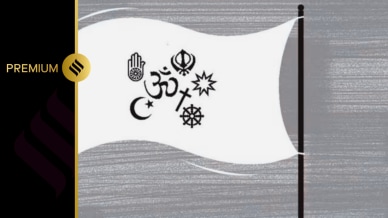The law prohibits conversion from one religion to another by misrepresentation, force, fraud, allurement or marriage.
In its opinion dated December 10, 2021, the Law department said legal aspects should be looked into, and the Home department ought to take a “proper decision” before seeking their approval.
However, six days later, in a meeting of the scrutinising committee of Karnataka’s Department of Parliamentary Affairs and Legislation, it was decided that the Bill can be placed before the cabinet for clearance, and that the law is not in conflict with existing laws.
The meeting was headed by J C Madhu Swamy, the then Minister of Law, Parliamentary Affairs and Legislation. The Bill received cabinet approval in a meeting held on December 21, 2021 and was passed by the Legislative Assembly on December 23, 2021, but got stuck in Legislative Council because it was adjourned sine die. Swamy did not respond to calls and messages seeking a comment.
Afterwards, the then BJP government introduced an ordinance citing “utmost urgency” to curb “religious conversion”, which was approved by the Governor on May 17, 2022. According to records, the draft ordinance was discussed with the department of Parliamentary Affairs and Legislation, which approved it on May 5, 2022, and noted that no further scrutinising committee meeting is required on the issue.
It was passed by the Karnataka Legislative Council on September 15, 2022 and by the Legislative Assembly on September 21, 2022.
Story continues below this ad
After it came to power, the current Congress government in Karnataka decided to repeal the law. The Congress had opposed the law on the grounds that it was “unconstitutional” and “against the right to freedom of religion” enshrined in the Constitution. On June 15, state Law Minister H K Patil said after a Cabinet meeting that a decision had been taken to repeal the Act in the monsoon session of the legislature in July. However, that was not done, and the law continues to be in place.
What did the Law department under then BJP government say?
“The Draft Cabinet note is to be seen in the light of Article 25(1) of the Constitution of India, which reads thus – ‘… all persons are equally entitled to freedom of conscience and the right freely to profess, practice and propagate religion’. The Supreme Court in the case of Ratilal Panachand Gandhi V. State of Bombay has made provision of Article 25 clearer by confirming that every person has a fundamental right under our Constitution, not merely to entertain such religious belief… but to exhibit his belief… and further to propagate his religious views for the edification of others,” reads its letter to the Home department dated December 10, 2021.
The Law department noted that some states – Odisha in 1967, Madhya Pradesh in 1968, Arunachal Pradesh in 1978, Chhattisgarh in 2000, Gujarat in 2003, Himachal Pradesh in 2006, Jharkhand in 2017 and Uttarakhand in 2018 – have enacted anti-conversion laws.
“The Orissa Act was challenged in the case of Yulitha Hyde V. The State of Orissa on two grounds, namely (a) The state legislature has no legislative competence to legislate on matters covered by the Act, and (b) The Act infringes the fundamental right guaranteed under Article 25 of the Constitution. The Supreme Court – observing that Article 25(1) guarantees conversion as part of the Christian religion; the definition of inducement is too vague; and the state has no power to enact the legislation since the Act deals with religion and not public order – declared the said Act unconstitutional,” wrote the department.
Story continues below this ad
It further wrote, “As with the Orissa Act 1967, Madhya Pradesh Act was also challenged two years later.” In this case, however, the court found the law to be within the competence of the state government.
“In addition to this, Uttar Pradesh Prohibition of Unlawful Conversion of Religion Ordinance, 2020; Uttarakhand Freedom of Religion Act, 2018; Himachal Pradesh Freedom of Religion Act, 2019; and Madhya Pradesh Freedom of Religion Bill, 2020 are challenged before the Supreme Court and petitioners have prayed to declare the said legislations/Bills as unconstitutional and the same is pending,” it stated.
“It is to be noted that at the central level, India does not have a law which provides any sanction in case of forcible conversions. In view of the above, the administrative department is advised to take a proper decision before placing the draft cabinet note for its (Law department’s) approval,” added the department.
Home department rationale
In the Cabinet note, the Home department said that the state has noticed many instances of conversion by means of allurement, coercion, force, fraudulent means as well as “mass conversion”.
Story continues below this ad
“In order to ensure public order in the state, it is essential to prevent such incidents from recurring. Such conversions/mass conversions occuring by taking advantage of the innocence, helplessness and financial inevitability of the people of the state must be immediately curbed,” said the ministry in its Cabinet note.
It also said the Law Commission of Karnataka, after studying various laws on the subject and considering the situation in the state, has made recommendations to the government to enact a suitable law on the subject in its 30th report.
The ministry also cited a 1977 Supreme Court order, and said that the “right to propagate” religion under Article 25 does not include the right to convert another person.
